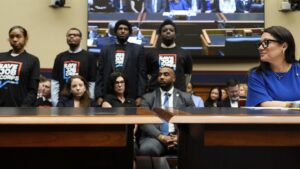
California Governor Gavin Newsom has launched a high-profile lawsuit against Fox News, accusing the network of defamation by misrepresenting his interactions with former President Donald Trump. The lawsuit, filed on Friday in Delaware Superior Court, demands $787 million in damages — a figure strikingly similar to the $787.5 million settlement Fox News agreed to pay Dominion Voting Systems earlier this year.
The lawsuit centers on allegations that Fox News hosts falsely accused Newsom of lying about a phone call with Trump, during a period when National Guard troops were deployed to Los Angeles against Newsom’s wishes amid protests over immigration policies. Newsom argues that Fox News, by broadcasting misleading information, has not heeded the lessons from its recent legal battles.
Background and Context of the Lawsuit
The lawsuit filed by Newsom draws parallels to the high-stakes defamation case brought by Dominion Voting Systems against Fox News. In that case, Dominion accused the network of promoting false claims that the company had rigged the 2020 presidential election. The settlement, reached in April 2023, was one of the largest in media defamation history.
Newsom’s legal team, including attorneys Michael Teter and Mark Bankston, collaborated with Farnan LLP, the same law firm that represented Dominion. The governor’s complaint highlights instances where Fox News hosts, including John Roberts and Jesse Watters, allegedly misrepresented the timing and content of his interactions with Trump.
“Unfortunately, the past two years have shown that the Dominion settlement did not serve as the deterrent many had predicted, as Fox has continued to launder the stream of false information flowing out of the White House,” Newsom’s lawsuit states.
Fox News’ Response and Legal Challenges
Fox News has dismissed Newsom’s lawsuit as a “transparent publicity stunt” aimed at stifling free speech. The network has vowed to defend itself vigorously, anticipating the case’s dismissal. The network is no stranger to legal challenges; it is currently embroiled in another defamation lawsuit with Smartmatic, an election technology company, which remains unresolved in a New York court.
Defamation cases involving public figures like Newsom face significant hurdles due to First Amendment protections. Plaintiffs must demonstrate “actual malice,” proving that the defendant knowingly spread falsehoods or acted with reckless disregard for the truth.
Implications for Media and Politics
Newsom’s lawsuit underscores the ongoing tensions between political figures and media outlets, particularly in the polarized landscape of American politics. The governor’s demand for Fox News to retract its statements and issue an apology reflects a broader call for accountability in media reporting.
“If Fox News wants to lie to the American people on Donald Trump’s behalf, it should face consequences — just like it did in the Dominion case,” Newsom stated. “I believe the American people should be able to trust the information they receive from a major news outlet.”
Meanwhile, former President Trump has also been active in the legal arena, having filed lawsuits against various media entities. Earlier this year, Disney settled a lawsuit with Trump, and he is currently in settlement discussions with Paramount over a “60 Minutes” episode that he claims was misleadingly edited.
Looking Ahead: The Future of Media Accountability
As Newsom’s lawsuit unfolds, it raises questions about the future of media accountability and the role of defamation suits in shaping journalistic practices. The case could set a precedent for how public figures seek redress against perceived media misrepresentation.
The outcome of Newsom’s legal battle with Fox News will be closely watched by both media professionals and political observers, as it may influence how news organizations handle politically sensitive stories in the future. Whether the lawsuit will lead to a significant change in media practices or serve as a cautionary tale for both parties remains to be seen.






